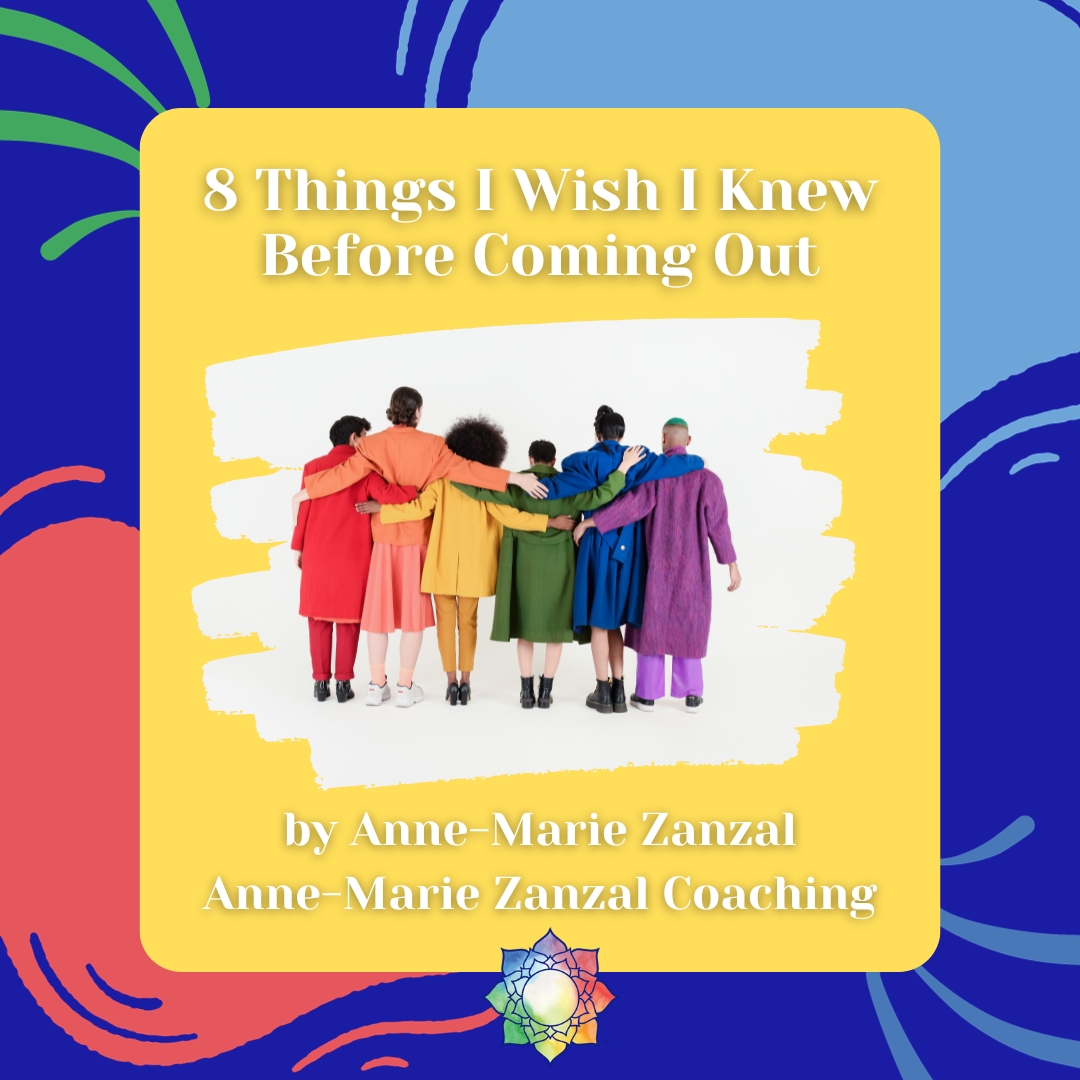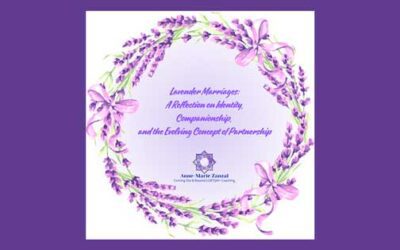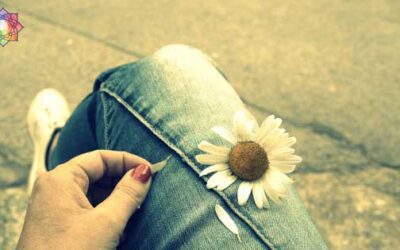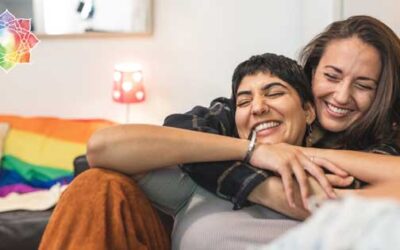by Barb Rowlandson
So, you’ve figured out you’re not as straight as you previously thought you were. Congrats! Though it might seem a little bit scary, you’re about to embark on a remarkable journey. The ranks of late-in-life lesbians are ever-increasing. Though you might think what you’re experiencing is rare or unusual, coming out later in life is hardly a new thing. Many, many, MANY women (and non-binary folks!) have made this journey before you, me included.
When I came out in 2017, I was heading into my mid-40’s and the world of lady love was new, exciting, and delicious. However, though I sailed gleefully into the world of gayness, it wasn’t always easy for me to navigate; I had plenty of bumps and discoveries along the way.
Here are the top 8 things I wish I’d have known about coming out as a lesbian later in life:
1. People will assume you were in the closet this whole time.
When I told a beloved aunt that I was in love with a woman, she was giddily happy for me, exclaiming “It must be like exhaling after holding your breath for a long time!” Though her sentiment was very sweet, it didn’t really describe my experience. I’d spent my whole life thinking I was ‘strictly d*ckly.’ My sexual attraction to women bloomed — to my complete astonishment— in my mid-40’s. I’m in good company; research shows that sexual fluidity in women 40+ is actually pretty common.
2. Other people who’ve known you for a long time might assume you’re bisexual.
When I came out to another one of my nearest and dearest, she was very sweet and accepting, and remarked on how I’d “turned bisexual”. I get it, this friend has only ever known me to be interested in men. For those who’ve known you a long time, it takes some mental calisthenics to wrap their minds around the big change in your sexuality.
To be completely transparent, when I first came out, I didn’t know how to identify my own sexual orientation and bisexual didn’t feel like a good fit for me. Be patient with yourself and others as you figure out your sexual identity. In a world where people like labels, you might feel pressured to “pick a team”, but honestly, there’s no hurry. Take your time to figure out the description that fits best, and the friends who love and support you will accept that description over time.
3. Your lesbian partner may not love your ambiguity towards labels.
My first girlfriend, 7 years my senior, had a big problem with my resistance to describing myself as a lesbian. As I wandered into the wilderness of my newfound queerness, I knew I absolutely loved and was sexually attracted to her. But, after a lifetime of marriage to a man, I questioned whether these feelings would remain exclusive. I also didn’t feel a burning need to label my sexual orientation.
For me it was quite simple: once I loved him, now I loved her. My girlfriend goaded me endlessly about my resistance to the label “lesbian” and seemed hurt that I didn’t similarly identify. It wasn’t until well into the relationship that I began to see the context behind her hurt feelings; she had spent a lifetime as an out-and-proud lesbian, and societal acceptance of that word was a long time coming for her.
Growing up in the 80’s, I remember vividly how words like f*g and lesbian were flung as insults on the schoolyard. While I still feel she should have been more patient about my journey as I explored the changes in my identity, I totally appreciate why my reluctance to explicitly come out as a lesbian stung her pride.
4. Speaking of labels, your older gay peeps might hate the word Queer.
The word Queer is having its moment of reclamation. Younger gay folk and older newbie gays like me like the malleability of the word; it seems to handily include a buffet of sexual identities without the rigidity of binary labels like “gay,” “lesbian,” and “bi-sexual”.
I’m here to tell you that there’s a good chance your mature gay and lesbian friends will cringe when they hear the word Queer. Don’t forget, Queer was a weaponized word for many and some simply can’t shake their long and justifiably held negative associations of that word.
5. Your straight friends and acquaintances might look at you like you’re from outer space.
Hey, discovering that you aren’t straight later in life was probably a pretty big shock to you, so no surprise it can go over like a lead balloon with others who’ve known you as a straight person. I lived in a small community where people talk. When I first came out, I used to know who’s heard the news by the expression on their faces. There may be people in your sphere who will look at you like you’ve grown a second head.
For me, shrugging it off came easily, but you might find it unsettling at first. This may be especially true for those of you who’ve been part of a traditional faith community. The cure for this is time. Eventually, the shocking news about you ‘switching teams’ will become old. Let me assure you, in a couple of weeks, people will turn their attention to some other bit of local gossip.
6. You may want to hold hands in public, but your partner may not.
Here’s the thing: I spent 21 years in a marriage where it was completely socially acceptable to hold hands, kiss, hug and show affection for my opposite-sex partner in public. I was accustomed to this privilege, and after I began dating women I’d be damned if I was to give it up. I remember being out and about with my second girlfriend, slipping my hand into hers as we walked towards a restaurant. She jerked her hand away from mine, something I didn’t expect or like.
Later, as we sat across from each other in a booth waiting for our meals, she apologized. She explained that she didn’t know this area and she didn’t feel safe. Her fear was that if someone were to do something hateful at the sight of us holding hands, she was scared that she couldn’t protect us.
In my short time as a Queer person — and certainly never in my life as a straight, married woman — I have never, ever felt scared to express who I am or affection for someone I love in public. Right then and there, I checked my privileged experience at the door. Respect your partner’s feelings when she doesn’t want to show any PDA. Chances are, she’s been gay for a lot longer than you have, and, consequently, her lived experience has given her good reason to feel hesitant about openly showing her affection.
7. You may feel like you don’t belong anywhere.
I confess, I struggled for a few years feeling like I was a visitor in a foreign land. When I came out, I felt like I’d been downgraded from full to associate member of my club of straight, married friends. I suddenly became the ‘other’, the woman who had the gall leave her heteronormative life. Conversations with straight married friends got a little weird after I came out.
Some made a show of accepting my new identity. Some tried to relate by talking about gay friends or family. I heard a lot of “I’d be a lesbian too if I didn’t like d*ck so much.” Some, to my surprise, flirted with me; others stopped talking to me completely. Without a doubt, the conversations have changed greatly when in the company of straight women friends.
Conversely, I didn’t always feel I belonged when in the company of people who have been out for their whole lives. I don’t identify with those shared, common experiences of growing up LGBTQ. It left me feeling like a bit of a tourist-turned-local among my gay and lesbian friends. I reminded myself that my experiences — however weirdly timed — are valid too. And, with the passage of time, those feelings subsided as I settled into my new life.
8. Your first same-sex relationship breakup is gonna hurt like hell.
Think back, waaaay back, to your high-school days when you had that first serious romance. Remember how in looooooove you were? Remember the excitement, the crazy love and the hotness of it all? The newness of that first romantic experience made it seem like it was the most important thing in the world. Well, guess what? You will feel that exact same way when you have your first real Queer relationship, even if you’re in your 40s, 50’s, 60s or beyond.
Now, remember how crazy devastated you were at that first young breakup? Remember how you got stupid drunk with your friends and cried and made a massive embarrassment of yourself? That first breakup hurt so very much because it was the first time you’d loved and lost like that. Welp, I got news for you: same goes when you have your first breakup with a same-sex partner later in life.
Dating my first girlfriend opened me up to a whole lot of new, awesome feelings. Everything about it was different than anything I’d ever experienced with a man; the sex was way better, the companionship more companionable. It was exhilarating and hella hot — until it wasn’t. Be prepared, even as an oldster, for your hormones to be dialed to ‘teen’ in your first post-coming out relationship. This means when the breakup happens, you may find yourself drunk and openly sobbing in the lobby of a 5-star hotel while a lonely bald man tries to console and hit on you at the same time (I realize that example is, ahem, oddly specific).
If one day you wake up and find that it’s the ladies that give you the tingles instead of the fellas, take heart. You are not alone! For a lot of us, this is a normal path (even though it feels anything but normal at first). I will leave you with a piece of advice that I wish I’d had when I was first going through this: be gentle with yourself. And enjoy! You’re a grown-a** woman who has the right to claim happiness and pleasure with the person you love.
Read Anne-Marie’s Version of Her Things She Wish She Knew Before Coming Out Here >
Barbara Rowlandson is a mom, author, Humanist officiant, content marketing professional, plant enthusiast, student earning a Master’s of Psychology in
Counseling, and late in life lesbian. Barb’s works with Anne-Marie Zanzal Coaching on course and social media content, and produces the Coming Out & Beyond podcast. Barb came out in 2017 at age 45, as a result of having a catalyst relationship. Barb moved on from her catalyst and has navigated the ups and downs of dating as a late in life lesbian. Barb can advise you on everything from how to set up a dating profile, how to know when to jump into a relationship, and when to walk away. She lives in Ontario, Canada.
Join Anne-Marie and Barb for their upcoming workshop 5 Things You’ve Gotta Know When You Are Coming Out. It will be on Zoom January 8 – 12 at 1:00 PM CST. All sessions will be recorded. You must sign up to have access to this wonderful information. Register Here: comingoutsupport.net >




